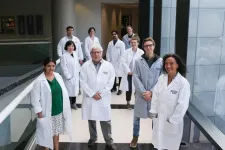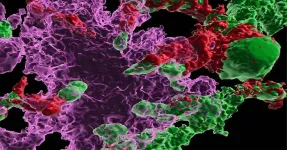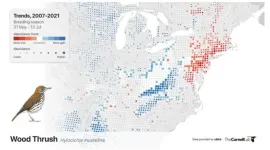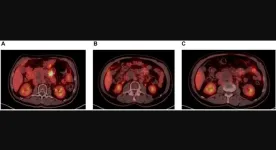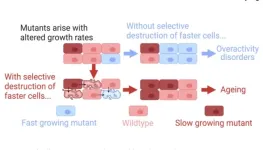(Press-News.org) Researchers are developing a way to incorporate one of the most human of characteristics – uncertainty – into machine learning systems.
Human error and uncertainty are concepts that many artificial intelligence systems fail to grasp, particularly in systems where a human provides feedback to a machine learning model. Many of these systems are programmed to assume that humans are always certain and correct, but real-world decision-making includes occasional mistakes and uncertainty.
Researchers from the University of Cambridge, along with The Alan Turing Institute, Princeton, and Google DeepMind, have been attempting to bridge the gap between human behaviour and machine learning, so that uncertainty can be more fully accounted for in AI applications where humans and machines are working together. This could help reduce risk and improve trust and reliability of these applications, especially where safety is critical, such as medical diagnosis.
The team adapted a well-known image classification dataset so that humans could provide feedback and indicate their level of uncertainty when labelling a particular image. The researchers found that training with uncertain labels can improve these systems’ performance in handling uncertain feedback, although humans also cause the overall performance of these hybrid systems to drop. Their results will be reported at the AAAI/ACM Conference on Artificial Intelligence, Ethics and Society (AIES 2023) in Montréal.
‘Human-in-the-loop’ machine learning systems – a type of AI system that enables human feedback – are often framed as a promising way to reduce risks in settings where automated models cannot be relied upon to make decisions alone. But what if the humans are unsure?
“Uncertainty is central in how humans reason about the world but many AI models fail to take this into account,” said first author Katherine Collins from Cambridge’s Department of Engineering. “A lot of developers are working to address model uncertainty, but less work has been done on addressing uncertainty from the person’s point of view.”
We are constantly making decisions based on the balance of probabilities, often without really thinking about it. Most of the time – for example, if we wave at someone who looks just like a friend but turns out to be a total stranger – there’s no harm if we get things wrong. However, in certain applications, uncertainty comes with real safety risks.
“Many human-AI systems assume that humans are always certain of their decisions, which isn’t how humans work – we all make mistakes,” said Collins. “We wanted to look at what happens when people express uncertainty, which is especially important in safety-critical settings, like a clinician working with a medical AI system.”
“We need better tools to recalibrate these models, so that the people working with them are empowered to say when they’re uncertain,” said co-author Matthew Barker, who recently completed his MEng degree at Gonville and Caius College, Cambridge. “Although machines can be trained with complete confidence, humans often can’t provide this, and machine learning models struggle with that uncertainty.”
For their study, the researchers used some of the benchmark machine learning datasets: one was for digit classification, another for classifying chest X-rays, and one for classifying images of birds. For the first two datasets, the researchers simulated uncertainty, but for the bird dataset, they had human participants indicate how certain they were of the images they were looking at: whether a bird was red or orange, for example. These annotated ‘soft labels’ provided by the human participants allowed the researchers to determine how the final output was changed. However, they found that performance degraded rapidly when machines were replaced with humans.
“We know from decades of behavioural research that humans are almost never 100% certain, but it’s a challenge to incorporate this into machine learning,” said Barker. “We’re trying to bridge the two fields, so that machine learning can start to deal with human uncertainty where humans are part of the system.”
The researchers say their results have identified several open challenges when incorporating humans into machine learning models. They are releasing their datasets so that further research can be carried out and uncertainty might be built into machine learning systems.
“As some of our colleagues so brilliantly put it, uncertainty is a form of transparency, and that’s hugely important,” said Collins. “We need to figure out when we can trust a model and when to trust a human and why. In certain applications, we’re looking at a probability over possibilities. Especially with the rise of chatbots for example, we need models that better incorporate the language of possibility, which may lead to a more natural, safe experience.”
“In some ways, this work raised more questions than it answered,” said Barker. “But even though humans may be mis-calibrated in their uncertainty, we can improve the trustworthiness and reliability of these human-in-the-loop systems by accounting for human behaviour.”
The research was supported in part by the Cambridge Trust, the Marshall Commission, the Leverhulme Trust, the Gates Cambridge Trust and the Engineering and Physical Sciences Research Council (EPSRC), part of UK Research and Innovation (UKRI).
END
How sure is sure? Incorporating human error into machine learning
2023-08-10
ELSE PRESS RELEASES FROM THIS DATE:
Large study suggests people with low levels of vitamin K have less healthy lungs
2023-08-10
People with low levels of vitamin K in their blood are more likely to have poor lung function and to say they suffer with asthma, chronic obstructive pulmonary disease (COPD) and wheezing, according to a study published today (Thursday) in ERJ Open Research [1].
Vitamin K is found in leafy green vegetables, vegetable oils and cereal grains. It plays a role in blood clotting, and so helps the body to heal wounds, but researchers know very little about its role in lung health.
Researchers say their new findings do not alter the current advice on vitamin K intake, but they do support further research to ...
Sanford Burnham Prebys Cancer Center earns merit extension from NCI
2023-08-10
Sanford Burnham Prebys’ Cancer Center has received a rare and prestigious Merit Extension Award from the National Cancer Institute (NCI), recognizing and rewarding its earlier accomplishments as well as current research plans. The award extends the center’s current 5-year Cancer Center Support Grant (CCSG) for an additional two years.
There are only seven Basic Laboratory Cancer Centers in the NCI’s national network. These centers focus primarily on laboratory research: developing, conducting, translating and advancing fundamental discoveries to clinical testing and, ultimately, ...
Stem cell therapy rescues symptoms of Alzheimer’s disease
2023-08-09
In the ongoing search for a cure for Alzheimer’s disease, a burgeoning branch of medicine is bringing new hope. Stem cell therapies are already being used to treat various cancers and disorders of the blood and immune system. In a new proof-of-concept study, scientists at University of California San Diego show stem cell transplants may also be a promising therapeutic against Alzheimer’s.
In the study, publishing this month in Cell Reports, the researchers demonstrate that transplanting hematopoietic ...
Penn Medicine neuroscientists identify brain mechanism that drives focus despite distractions
2023-08-09
PHILADELPHIA—Trying to finish your homework while the big game is on TV? “Visual-movement” neurons in the front of your brain can help you stay focused, according to a new study from neuroscientists in the Perelman School of Medicine at the University of Pennsylvania.
In the study, published recently in Neuron, the scientists sought to illuminate the neural mechanism that helps the brain decide whether to focus visual attention on a rewarding task or an alluring distraction. By analyzing neuron activity in animal models as they faced this kind of attentional ...
Novel machine-learning method produces detailed population trend maps for 550 bird species
2023-08-09
Scientists at the Cornell Lab of Ornithology have developed a novel way to model whether the populations of more than 500 bird species are increasing or decreasing. The method solves a nagging statistical problem by accounting for year-to-year changes in the behavior of people collecting the data. The result is detailed trend maps for each species down to an eight-mile radius--a major boost for local conservation efforts. Scientists used an approach called Double Machine Learning. Details are published in the journal Methods in Ecology and Evolution.
“Changing human behavior presents a problem for statistical analysis ...
CDK9 Inhibitors: A promising combination partner in treating hematological malignancies
2023-08-09
“[...] CDK9 inhibitors could play a role in future treatments of hematological diseases and could be a great ally when combined with other therapeutic approaches.”
BUFFALO, NY- August 9, 2023 – A new research perspective was published in Oncotarget's Volume 14 on August 7, 2023, entitled, “CDK9 INHIBITORS: a promising combination partner in the treatment of hematological malignancies.”
In their new perspective, researchers Daniel Morillo, Gala Vega and Victor Moreno from Hospital Fundación Jiménez Díaz discuss Cyclin-dependent ...
A novel theory of aging — independent of damage accumulation
2023-08-09
“We argue that in multicellular organisms, neighbouring cells are in constant competition.”
BUFFALO, NY- August 9, 2023 – A new editorial paper was published in Aging (listed by MEDLINE/PubMed as "Aging (Albany NY)" and "Aging-US" by Web of Science) Volume 15, Issue 14, entitled, “A novel theory of ageing independent of damage accumulation.”
The underlying cause or causes of aging are an enduring mystery, but in 1977 Kirkwood postulated that organisms might gain a fitness advantage by reducing investment in somatic maintenance if this allowed them to invest more resources in more crucial ...
Long-term use of certain acid reflux drugs linked to higher risk of dementia
2023-08-09
MINNEAPOLIS – People who take acid reflux medications called proton pump inhibitors for four-and-a-half years or more may have a higher risk of dementia compared to people who do not take these medications, according to new research published in the August 9, 2023, online issue of Neurology®, the medical journal of the American Academy of Neurology. This study does not prove that acid reflux drugs cause dementia; it only shows an association.
Acid reflux is when stomach acid flows into the esophagus, usually after a meal or when lying down. People with acid reflux may experience heartburn and ulcers. People ...
Research sheds new light on gene therapy for blood disorders
2023-08-09
Research from experts at Michigan Medicine, the Children’s Hospital of Philadelphia and Penn Medicine is breaking ground on new ways of treating blood disorders, such as sickle cell anemia, through gene therapy.
To cure blood disorders, patients must undergo high dose chemotherapy and bone marrow transplantation. This requires a match between the recipient and donor immune system, but ~30% of patients do not have a match. Even when they do the donor immune system can attack the patient, graft versus host disease.
Gene therapy corrects the mutation in a patient’s own cells ...
Few in US recognize inequities of climate change
2023-08-09
ITHACA, N.Y. – Despite broad scientific consensus that climate change has more serious consequences for some groups – particularly those already socially or economically disadvantaged – a large swath of people in the U.S. doesn’t see it that way.
A new national survey study found that just over one-third of U.S. adults believe climate change is impacting some groups more than others. Nearly half feel that climate change impacts all groups about equally. And when the question referenced race in climate impacts, even fewer people believed some groups are more adversely affected than others.
“Our earlier research showed that ...

